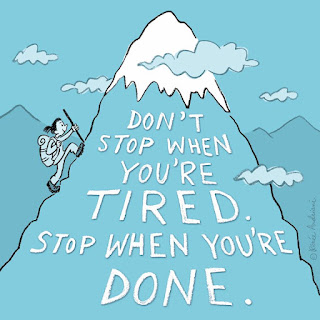"Tell me how I'm supposed to breathe with no air?"
 |
| Highest point of the lower states (not counting Alaska) |
 |
| Quandary Peak in Colorado, elevation 14,265' |
 |
| Climbing Mt. Rainier in Washington, elevation 14,411' |
It's been an interesting experience for me to hike at different altitudes. My home is at about 4,700' above sea level, and the mountains near my home where I hike most of the time get up to almost 12,000'. I've climbed above 14,000' about 35 times in Colorado, California, and Washington. (I have a tentative plan to get up to 19,300' later this year if I can get my post-COVID health issues under control!)
The body performs differently at those higher altitudes. As elevation increases, there is less air pressure, meaning the air is less dense, more spread out. Though the actual makeup of the air is the same, thinner air means less oxygen is available in each breath; it feels as if the percentage of oxygen in the air is less. This chart shows how the body perceives the oxygen percentage at various elevations:
- Sea Level - 20.9%
- 4500' - 17.6%
- 12000' - 13.2%
- 14000' - 12.3%
- 19000' - 10.1%
The body depends on oxygen for all muscle and brain activity; to some extent, it gets accustomed to the altitude where it spends time, and adapts to the oxygen available. But with a change of altitude to a situation where there is less oxygen, the body can't adapt quickly. Fatigue can increase rapidly, and symptoms such as headache, dizziness, nausea, and confusion can result. Different people feel the impact of these changes in different ways, and at different altitudes. In some situations this can turn into serious, even life-threatening conditions affecting the lungs, brain, or eyes.
One of my most dramatic experiences with this scenario occurred this past year. I had been living for several months at sea level in Buenos Aires, and my body was used to the rich, oxygen-heavy feeling of the dense air. As part of a mission assignment, we took a trip to the foothills of the Andes in northwestern Argentina, and drove up to a viewpoint that was well over 14000'. I hiked down a steep slope about a mile to a position where I could get a good angle on a photo, then returned up to where the car was. It was SO much harder than it should have been! I was panting and sweating far beyond the expected level of exertion.
I #GiveThanks for our amazing bodies, which have the ability to acclimate and adjust to these dramatic changes in environment. As a comparison, try diluting the gas in your car with water and see how well the engine runs. (Don't actually do this; just trust me, it's not a good idea.)
It's interesting to consider the other influences on our bodies or spirits. What other things in our environment might be "diluted" under certain conditions, and might impact how we feel and act? Can we feel a diminished sense of peace or security, a loss of the beneficial influence of relationships? During the past year of quarantine and isolation, many of us have been impacted by some of these changes.
Moreover, what about spiritual influences? How are we affected if we diminish the opportunities in our lives for pondering, study, prayer, service? What kinds of changes can that have on our behavior and well-being?
When a hiker is dealing with "Acute Mountain Sickness," one of the recommended treatments is to move as quickly as possible to a lower altitude where the body can more easily get oxygen to aid in the recovery. It's beneficial to consider if there are changes that we should make in any area of our life, where an increase of the right kind of influence could benefit our overall well-being.



Comments
Post a Comment